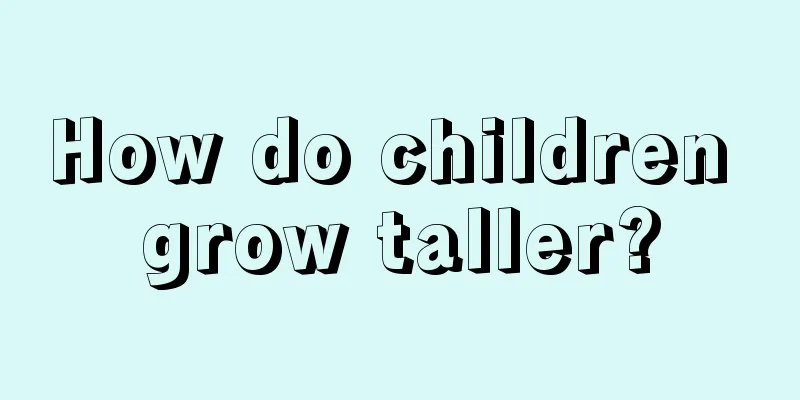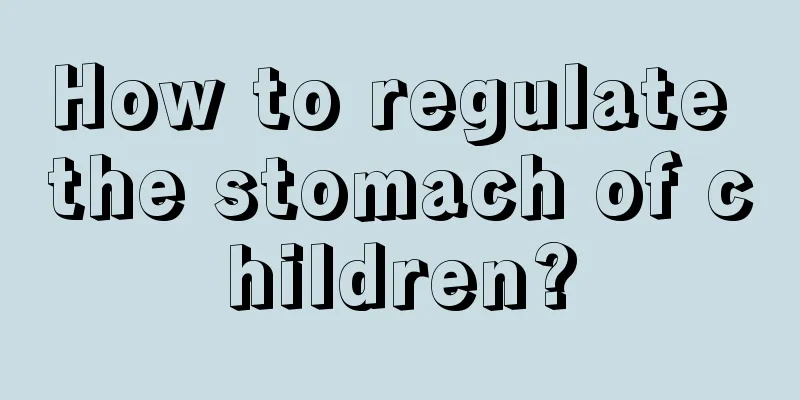Is it normal for children to change their teeth at the age of six?

|
What many parents care about most is their children's growth. Everyone hopes that their children can grow up healthily. So it is inevitable that the children will change their teeth at this time. However, many parents do not know when it is normal for their children to change their teeth. Some families' children start to change their teeth at the age of six. So is it normal to change teeth at this time? Next, we will ask authoritative experts to explain it to you. After children reach the age of 6, their deciduous teeth will fall out one after another and be replaced by permanent teeth. 6-12 years old is the period of tooth replacement For children aged five or six, changing their teeth may be more important than letting them play the piano, roller skate, or learn arithmetic. Because the newly grown permanent teeth will accompany them almost throughout their lives and are related to their diet, appearance, and even psychology. Health care during the tooth replacement period is very important and is directly related to whether the child’s teeth will be neat and beautiful in the future. Therefore, parents should strengthen the care of their children during this period so that their children can have good teeth. Note 1: Whether the deciduous teeth are retained or lost early There is a certain time and order for the shedding of deciduous teeth. Deciduous teeth that should fall out but don't are called retained deciduous teeth, and the consequence is often that permanent teeth cannot erupt in the normal position. Most children begin to change their teeth at the age of five or six, some start at the age of four, and some children may not lose their first deciduous tooth until the age of seven. Tooth loss usually starts with the two lower front teeth, followed by the two upper front teeth. The most common situation is that the lower front permanent teeth grow on the inside of the deciduous teeth, and the upper front permanent teeth grow on the outside of the deciduous teeth, making it look like double-layer teeth. What should you do in this situation? You should take your child to the hospital as soon as possible to remove the retained deciduous teeth and make room for the permanent teeth to erupt. If the deciduous teeth fall out before they should, it is called premature loss of deciduous teeth. This often causes the adjacent teeth on both sides to tilt toward the gap between the missing teeth, making the gap smaller and causing the permanent teeth to erupt out of place due to insufficient space. At this time, a gap maintainer (custom-made by the hospital's dental department) should be worn in the gap between the deciduous teeth to prevent the teeth on both sides from tilting, so as to maintain the proper eruption position of the permanent teeth until the permanent teeth erupt. Note 2: Is it difficult for permanent teeth to erupt? If the deciduous teeth fall out prematurely, the child will get used to chewing and licking with the gums, which will become thick and hinder the eruption of permanent teeth. Therefore, if your child has reached the age of replacing teeth but the permanent teeth have not yet grown, you should take your child to the hospital for examination in time to get the doctor's help. Calcium deficiency in children is also an important reason for the delayed eruption of permanent teeth. Parents should supplement their children with calcium in time. When the teeth are replaced, the permanent teeth erupt from below or inside the deciduous teeth. The erupted permanent teeth are the size of adult teeth. Mild crowding and twisting are normal, and the alignment can be adjusted automatically with the eruption of adjacent teeth and the growth and development of the jaw. As long as it is not cross-tooth (i.e. overbite), correction is generally not required, but regular observation should be performed, and the longest period should not exceed half a year. If the deciduous teeth are still not aligned properly after they are completely replaced, you should see a doctor promptly to avoid difficulties in correction due to delayed treatment. Note 3: Correct your child’s bad habits During the tooth replacement period, deciduous teeth and permanent teeth coexist. The permanent teeth have just erupted, especially the "six-year teeth" which are the "key to bite". They are large in size and have many pits and fissures on the occlusal surface, which easily retain food residues. In addition, most children do not brush their teeth thoroughly, so caries are often prone to occur. The most important thing at this time is to teach your child to brush their teeth correctly. During the tooth replacement period, when the deciduous teeth are loose and about to fall out, children often have the habit of licking the loose teeth with their tongues. This is a bad habit that will affect the normal eruption of permanent teeth and should be corrected in time. Note 4: Misaligned teeth can affect your appearance During the tooth replacement period, children's teeth are replaced, the jaws are developing, and the bite relationship is gradually established. Sometimes a temporary misalignment may occur, but during the development of the teeth, it can often adjust itself and return to normal. Some malocclusions, such as when the frenulum of the upper lip is too low, causing the gap between the upper front teeth to be too large and cannot be adjusted by itself, will affect facial development. You should go to the hospital for diagnosis and treatment, otherwise it will affect the child's appearance. Note 5: Prevention and treatment of caries in primary molars During the period of tooth replacement, deciduous molars are prone to caries. If caries cause apical disease, it can affect the growth and eruption of secondary permanent teeth. Therefore, attention should be paid to the timely treatment and prevention of caries in deciduous molars. We must not have the wrong idea that "deciduous teeth will be replaced sooner or later, so there is no need to treat them if they are damaged." Doctor's advice: Try to keep the deciduous teeth until the permanent teeth erupt. If the deciduous teeth are lost prematurely, it often leads to insufficient space for the secondary permanent teeth to erupt, causing malocclusion. Note 6: Eat more chewy foods when teeth are changing When children are about six or seven years old, permanent teeth begin to erupt and replace the original deciduous teeth. Although some children's permanent teeth have erupted, the deciduous teeth often refuse to "give way", forcing the permanent teeth to grow from the inside of the deciduous teeth, forming "double-layer teeth" and causing the permanent teeth to be unevenly arranged. There are many reasons for the delayed loss of deciduous teeth. The most common one is that children eat too finely and do not fully utilize the physiological stimulation of their teeth. The main function of teeth is to chew food. Chewing food can promote the growth and development of the roots of deciduous teeth as well as their natural absorption and shedding. Therefore, as children grow older, they should eat more chewy foods to maintain good stimulation to the deciduous teeth and encourage them to fall out on time. When the child's incisors and molars have erupted, you can add some celery, corn, apples and other foods to his or her diet to help the tooth replacement go smoothly and give your child a healthy and neat set of teeth. The above is the relevant article we brought to you about whether it is normal for children to change their teeth at the age of six. After reading the above article, I believe everyone has a certain understanding of the period of children's tooth replacement. After children change their teeth, we should pay more attention to their eating habits to ensure their healthy growth. |
<<: What is nodular goiter in children?
>>: How many months can babies take cod liver oil?
Recommend
Is it normal for premature babies to love sleeping?
Premature babies require more care and attention....
What causes frequent urination in six-year-old children?
If a 6-year-old child has frequent urination, on ...
How to treat infant facial hemangioma?
Hemangioma is one of the common diseases in infan...
What are the symptoms of a baby's heart problem?
Every baby is the hope and future of a family fro...
How to treat children’s cough with traditional Chinese medicine?
Different weather and seasons will also cause sub...
Key points for baby oral care
Many people think that oral care is just brushing...
How many teeth should be replaced?
Nowadays, many families have only one baby. Many ...
How to deal with the baby always spitting up milk during confinement
Spitting up milk is a very common phenomenon in b...
Why does my baby’s toenails become thicker?
Sometimes mothers will find that their children&#...
What's wrong with a child complaining of leg pain at night?
Many babies will encounter this or that problem i...
10 What to do if your child has trouble falling asleep
Insomnia usually only occurs in adults. Some pare...
What should I do if my baby got a bump on the back of his head?
The birth of the baby brought a lot of happiness ...
Should children take anti-inflammatory drugs for cough?
Whenever the weather reaches autumn and winter, c...
Does it hurt when children are teething?
Nowadays, many new mothers do not know the reason...
What to do if your child has an upper respiratory tract infection and coughs
If a child has an upper respiratory tract infecti...









